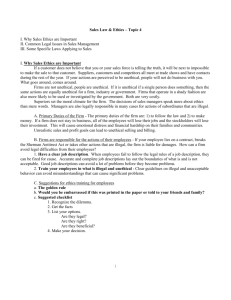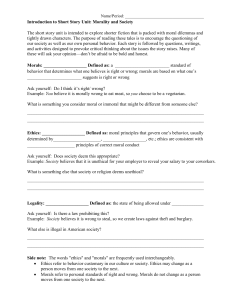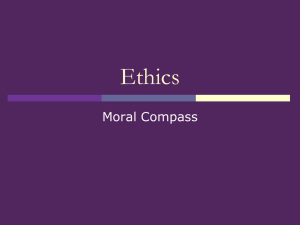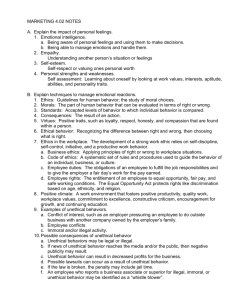Megan Fitzgerald Gerhardt PBMF-6 11/3/15 Chapter 4 Presentation
advertisement
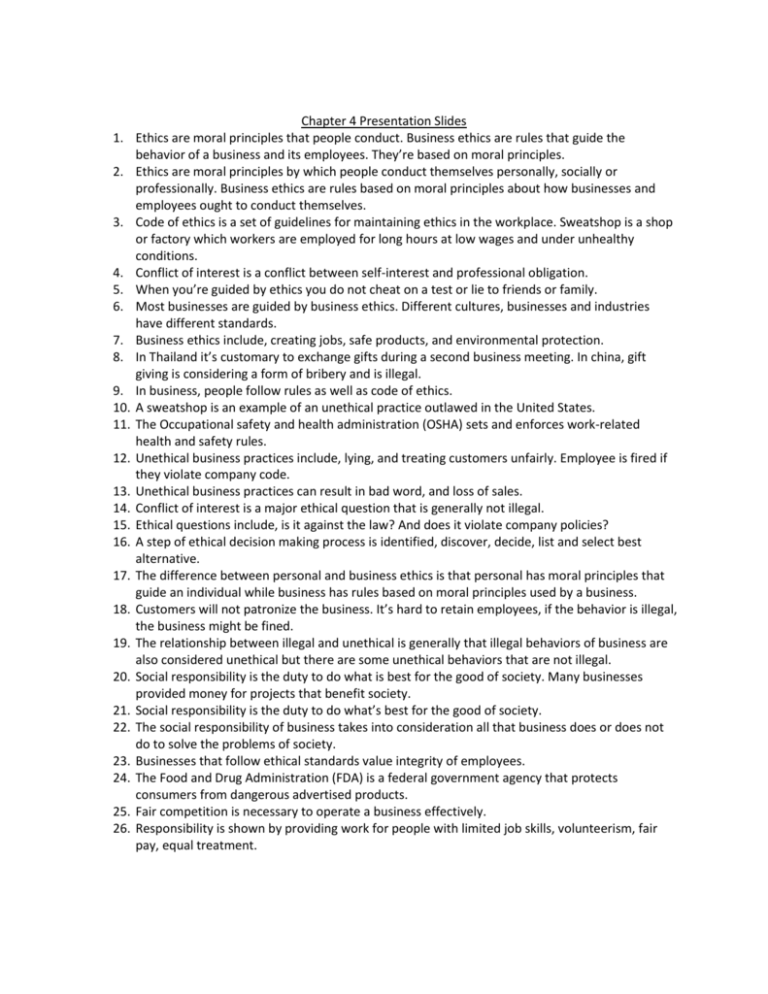
Megan Fitzgerald Gerhardt PBMF-6 11/3/15 Chapter 4 Presentation Slides 1. Ethics are moral principles that people conduct. Business ethics are rules that guide the behavior of a business and its employees. They’re based on moral principles. 2. Ethics are moral principles by which people conduct themselves personally, socially or professionally. Business ethics are rules based on moral principles about how businesses and employees ought to conduct themselves. 3. Code of ethics is a set of guidelines for maintaining ethics in the workplace. Sweatshop is a shop or factory which workers are employed for long hours at low wages and under unhealthy conditions. 4. Conflict of interest is a conflict between self-interest and professional obligation. 5. When you’re guided by ethics you do not cheat on a test or lie to friends or family. 6. Most businesses are guided by business ethics. Different cultures, businesses and industries have different standards. 7. Business ethics include, creating jobs, safe products, and environmental protection. 8. In Thailand it’s customary to exchange gifts during a second business meeting. In china, gift giving is considering a form of bribery and is illegal. 9. In business, people follow rules as well as code of ethics. 10. A sweatshop is an example of an unethical practice outlawed in the United States. 11. The Occupational safety and health administration (OSHA) sets and enforces work-related health and safety rules. 12. Unethical business practices include, lying, and treating customers unfairly. Employee is fired if they violate company code. 13. Unethical business practices can result in bad word, and loss of sales. 14. Conflict of interest is a major ethical question that is generally not illegal. 15. Ethical questions include, is it against the law? And does it violate company policies? 16. A step of ethical decision making process is identified, discover, decide, list and select best alternative. 17. The difference between personal and business ethics is that personal has moral principles that guide an individual while business has rules based on moral principles used by a business. 18. Customers will not patronize the business. It’s hard to retain employees, if the behavior is illegal, the business might be fined. 19. The relationship between illegal and unethical is generally that illegal behaviors of business are also considered unethical but there are some unethical behaviors that are not illegal. 20. Social responsibility is the duty to do what is best for the good of society. Many businesses provided money for projects that benefit society. 21. Social responsibility is the duty to do what’s best for the good of society. 22. The social responsibility of business takes into consideration all that business does or does not do to solve the problems of society. 23. Businesses that follow ethical standards value integrity of employees. 24. The Food and Drug Administration (FDA) is a federal government agency that protects consumers from dangerous advertised products. 25. Fair competition is necessary to operate a business effectively. 26. Responsibility is shown by providing work for people with limited job skills, volunteerism, fair pay, equal treatment. Megan Fitzgerald Gerhardt PBMF-6 11/3/15 27. The equal pay act requires that men and women be paid the same wages for doing equal work. The Americans with disabilities act bans discrimination against people with physical or mental disability. 28. In 1970, the U.S government created the environmental protection agency (EPA), they inforce rules that protect the environment and control pollution. 29. The government passed the sarbannes-oxley act to mandate truthful reporting. They make the CEO of a business more accountable for the actions of the financial managers. 30. Many products and services benefit society. 31. The mission of the FDA is to protect the quality and safety of the food and drugs in the marketplace. 32. The biggest issue is the environmental responsibility.



